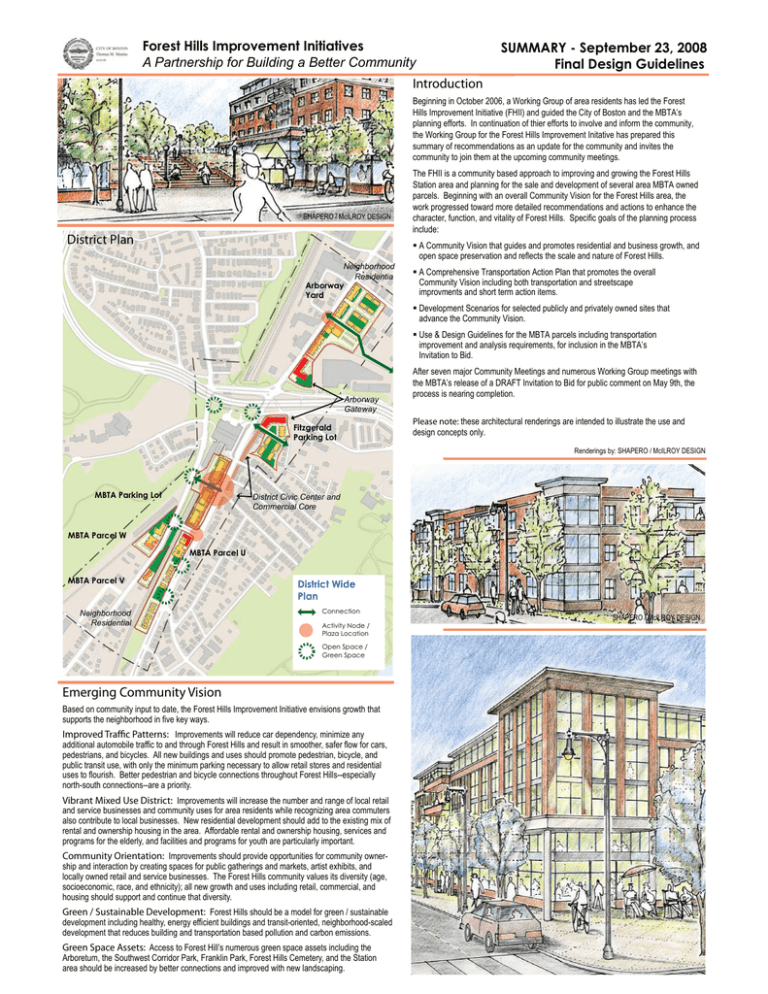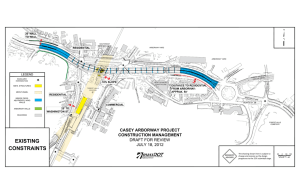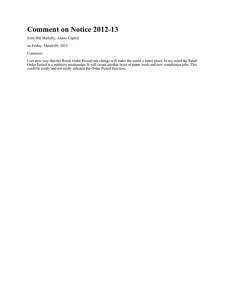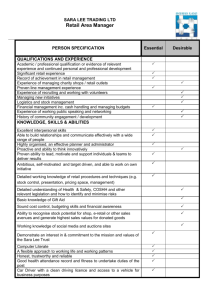Forest Hills Improvement Initiatives SUMMARY - September 23, 2008 Final Design Guidelines Introduction
advertisement

Forest Hills Improvement Initiatives A Partnership for Building a Better Community SUMMARY - September 23, 2008 Final Design Guidelines Introduction Beginning in October 2006, a Working Group of area residents has led the Forest Hills Improvement Initiative (FHII) and guided the City of Boston and the MBTA’s planning efforts. In continuation of thier efforts to involve and inform the community, the Working Group for the Forest Hills Improvement Initative has prepared this summary of recommendations as an update for the community and invites the community to join them at the upcoming community meetings. SHAPERO / McILROY DESIGN District Plan The FHII is a community based approach to improving and growing the Forest Hills Station area and planning for the sale and development of several area MBTA owned parcels. Beginning with an overall Community Vision for the Forest Hills area, the work progressed toward more detailed recommendations and actions to enhance the character, function, and vitality of Forest Hills. Specific goals of the planning process include: A Community Vision that guides and promotes residential and business growth, and open space preservation and reflects the scale and nature of Forest Hills. Neighborhood Residentia Arborway Yard A Comprehensive Transportation Action Plan that promotes the overall Community Vision including both transportation and streetscape improvments and short term action items. Development Scenarios for selected publicly and privately owned sites that advance the Community Vision. Use & Design Guidelines for the MBTA parcels including transportation improvement and analysis requirements, for inclusion in the MBTA’s Invitation to Bid. Arborway Gateway Fitzgerald Parking Lot After seven major Community Meetings and numerous Working Group meetings with the MBTA’s release of a DRAFT Invitation to Bid for public comment on May 9th, the process is nearing completion. Please note: these architectural renderings are intended to illustrate the use and design concepts only. Renderings by: SHAPERO / McILROY DESIGN MBTA Parking Lot District Civic Center and Commercial Core MBTA Parcel W MBTA Parcel U MBTA Parcel V Neighborhood Residential District Wide Plan Connection Activity Node / Plaza Location Open Space / Green Space Emerging Community Vision Based on community input to date, the Forest Hills Improvement Initiative envisions growth that supports the neighborhood in five key ways. Improved Traffic Patterns: Improvements will reduce car dependency, minimize any additional automobile traffic to and through Forest Hills and result in smoother, safer flow for cars, pedestrians, and bicycles. All new buildings and uses should promote pedestrian, bicycle, and public transit use, with only the minimum parking necessary to allow retail stores and residential uses to flourish. Better pedestrian and bicycle connections throughout Forest Hills--especially north-south connections--are a priority. Vibrant Mixed Use District: Improvements will increase the number and range of local retail and service businesses and community uses for area residents while recognizing area commuters also contribute to local businesses. New residential development should add to the existing mix of rental and ownership housing in the area. Affordable rental and ownership housing, services and programs for the elderly, and facilities and programs for youth are particularly important. Community Orientation: Improvements should provide opportunities for community ownership and interaction by creating spaces for public gatherings and markets, artist exhibits, and locally owned retail and service businesses. The Forest Hills community values its diversity (age, socioeconomic, race, and ethnicity); all new growth and uses including retail, commercial, and housing should support and continue that diversity. Green / Sustainable Development: Forest Hills should be a model for green / sustainable development including healthy, energy efficient buildings and transit-oriented, neighborhood-scaled development that reduces building and transportation based pollution and carbon emissions. Green Space Assets: Access to Forest Hill’s numerous green space assets including the Arboretum, the Southwest Corridor Park, Franklin Park, Forest Hills Cemetery, and the Station area should be increased by better connections and improved with new landscaping. SHAPERO / McILROY DESIGN Forest Hills Improvement Initiatives A Partnership for Building a Better Community Sustainable Development & Green Building Guidelines New development should enhance the overall sustainability of the Forest Hills neighborhood through a careful mix of new uses and compact / low impact development strategies. The potential new uses will aproximate the following: Open Space: 192,000 SF Housing: 375 to 461 Units Office / Commercial: 145,000 to 356,000 SF Retail / Services: 98,000 to 118,000 SF All new buildings are to be Green Buildings and must be designed and constructed to meet the most appropriate U.S. Green Building Council Leadership in Energy and Environmental Design standard at the Certified level or better and comply with Department of Neighborhood Development Healthy Homes Standards. U.S. Green Building Council Certification is highly encouraged but not required. Design Guideline Summary CM 10 - September 23, 2008 Focus & Character 1. Arborway Yard Character - Office & Multi-family Commercial - brick masonry w/ tall ground floor retail windows. Residential - wood frame row house & multi-family flat. Consistant with existing area buildings. Provide for high quality construction & materials. 2. Fitzgerald Parking Lot Gateway Commercial / Residential Mix of commercial and / or residential at the Hyde Park Ave. / Arborway corner. Character - Office / Apartment Brick masonry consistant with existing area buildings. Provide for high quality construction & materials. 1. Arborway Yard 3. MBTA Parcel S (Station Parkin Lot) 2. Fitzgerald Parking Lot 6. MBTA Parcel W Gateway Commercial / Residential Mix of residential with some community uses at northern half; residential at adjacent interior; and commercial office over retail; at southern half. Commercial Core / Office Mix of commercial office / institutional over retail. Include “Village Center” plaza and pedestrian pathway connecting Hyde Park Ave. to Arnold Arboretum. Replace existing commuter parking spaces at southern end. Character - Office / Retail Brick masonry consistant with existing area buildings. Tall ground floor retail windows. Screen parking garage elements & cars from view. Provide for high quality construction to address adjacent train vibration & noise. 3. MBTA Parcel S (Station Parking Lot) 4. MBTA Parcel U 4. MBTA Parcel U 5. MBTA Parcel V Neighborhood Residential Residential with some local retail along Hyde Park Ave. at Ukraine Way and at Walk Hill St. Recommended Uses & Disposition Status Office / Commercial Upper story commercial / office space as anchor use for district; locate at southern end of site including LRV Reserve if available. Retail Active ground floor retail / service businesses with youth orientation and usable outdoor space that provide for community needs. Include mini-anchor business(es) - e.g. grocery, drug store. Focus active uses at southern end to reinforce connections under Casey Overpass. Residential Mix of unit types including family housing; Studios, 1, 2, 3, and 4 bedroom units on Other northern half of site. Consider some artist Community service needs including on-site focus with live / work spaces and / or lofts. childcare, youth and senior service centers. Potential Build Out Site Area Building Hts Open Space Housing Units Retail Office / Comm. Community Parking 6.37 Acres / 277,323 SF 4 and 5 stories 62,000 SF / 23% of Site 160 Units 45,000 SF 20,000 SF 8,000 SF (childcare) 120 SP (Resident) 155 SP (Commercial) Site Area Building Hts Open Space Housing Units Retail Office / Comm. Parking Options 2.31 Acres / 100,477 SF 4 with 5 stories at corner 36,000 SF / 37% of Site Option / up to 135 Units 15,000 SF Option / up to 40,000 SF 120 SP (Resident) 15 SP (Retail) 40 SP (Commercial) City RFP in 3 to 6 years. Office / Commercial Upper story commercial / office space located along Hyde Park Ave. and the Arbor Way. Retail Active ground floor retail / service businesses with usable outdoor space along Hyde Park Ave. that provide for community needs. Include mini-anchor (i.e. pharmacy) and locally based Residential businesses. Focus active uses at corner to Mix of unit types including family housing; reinforce connections under Casey Overpass. Studios, 1, 2, 3, and 4 bedroom units. Privately Owned - Available. Commercial Office / Institutional Active commercial and office / institutional space (education, office, health services, movie theater) at Washington St. ground level (2nd floor on Hyde Park Ave.). Provide upper story commercial office / institutional space as anchor use for the district at the northern end of site adjacent to the MBTA Station. Retail Site Area Active ground floor retail / service businesses Building Hts with usable outdoor space along Hyde Park Ave. Open Space that provide for community needs. Include Retail mini-anchor and locally based businesses. Office / Comm. Focus active uses on Center Plaza. Community Parking Other Parking Community service needs including on-site 3.16 Acres / 137,662 SF 5 / 6 stories (Wash. St. / HP Ave.) 22,000 SF / 16% of Site 42,000 SF 163,000 SF 6,000 SF 411 SP (Commercial / Retail) 240 SP (Commuter) childcare, youth, and senior service centers. MBTA Owned - Available Now Residential Mix of unit types with a focus on family housing; Studios, 1, 2, 3, and 4 bedroom units. Character - Apartment & Multi-family Apartment - wood frame or brick masonry. Multi-family - wood frame. Consistant with existing area buildings. Provide for high quality construction & materials to address adjacent train vibration & noise. Retail Limited ground floor uses that provide for local neighborhood needs. Include such uses as a small grocery store, dry cleaner, bookstore, and café. Other Community service needs including on-site childcare, youth and senior service centers. Site Area Building Hts Open Space Housing Units Retail Office / Comm. Community Parking 2.82 Acres / 122,799 SF 3 stories (4 at northern corner) 29,000 SF / 24% of site 120 units 4,000 SF N/A 4,000 SF (day care) 103 SP (Resident) 0 SP (Retail) Site Area Building Hts Open Space Housing Units Retail Local Com m . Com m unity Parking Options 0.53 Acres / 22,972 SF 3 stories 18,000 SF / 79% of site (min.) Option / up to 6 units Option / 4,000 SF Option / up to 8,000 SF Option / TBD 6 SP (Resident) 4 SP (Retail) 8 SP (Commercial) MBTA Owned - Available Now Renderings by: SHAPERO / MCILROY DESIGN Vehicle Parking & Service Access Guidelines The community goal is for reduced car dependency by requiring the minimum parking necessary for retail and residential uses to flourish, transportation demand management programs that encourage public transit, walking and biking, and car sharing. The community also encourages shared parking strategies to maximize off-hours use of commuter parking spaces and to minimize the overall need and cost for off street parking. 5. MBTA Parcel V Character - Multi-family or Business Wood frame or masonry consistant with existing area buildings. Provide for high quality construction & materials to address adjacent train vibration & noise. Residential: 0.75 to 1 space per unit, 1 visitor space per 10 units. Retail / Services: over 5,000 SF – 0.75 to 1 space per 1,000 SF Commercial / Non-retail: 0.75 to 2 spaces per 1,000 SF Loading & Service Areas: are to be located off-street and screened from views Bike Storage Guidelines The community goal is to promote pedestrian, bicycle, and public transit use. Better pedestrian and bicycle connections throughout Forest Hills are a priority. Residential: 1 accessible, indoor, secure bicycle space per unit, 1 visitor bike space per 10 units. Retail: 1 accessible, indoor, secure bicycle space per 10,000 SF, visitor bike rack(s) with 1 bike space per 10,000 SF. Commercial Non-retail: 1 accessible, indoor, secure bicycle space per 10,000 SF, visitor bike rack(s) with 1 bike space per 10,000 SF. Neighborhood Residential or Local Commercial Residential and / or neighborhood retail; retain and improve open space at narrow southern end connecting to Southwest corridor. 6. MBTA Parcel W Neighborhood Residential or Local Commercial Residential and / or neighborhood retail; provide open space element at narrow northern end of site. Character - Apartment or Business Wood frame or masonry consistant with existing area buildings. Provide for high quality construction & materials to address adjacent train vibration & noise. Commercial Provide for locally based commercial businesses to support community needs & as anchor uses for district. Retail Active ground floor retail / service businesses with youth orientation and usable outdoor space that provide for community needs. Include locally based businesses. Relate uses and outdoor space to adjacent linear park. Residential Professional housing limited to Studios, 1 and 2 bedroom units. Other Community service needs including youth oriented businesses. MBTA Owned - Available Now w/ W Commercial Provide for locally based commercial businesses to support community needs & as anchor uses for district. Residential Mix of unit types with a focus on family housing; Studios, 1, 2, 3, and 4 bedroom units. Retail Active ground floor retail / service businesses that provide for community needs. Include a mini-anchor business such as a grocery store, restaurant / café, dry cleaners, hardware store, bookstore, or commercial business. Other Community service needs including on-site childcare center. MBTA Owned - Available Now w/ V Site Area Building Hts Open Space Housing Units Retail Local Comm. Community Parking Options 1.34 Acres / 58,541 SF 3 stories (4 at southern end) 23,000 SF / 40% of site Option / up to 40 units Option / up to 10,000 SF Option / up to 32,000 SF 2,000 SF 36 SP (Resident) 10 SP (Retail) 32 SP (Commercial)



